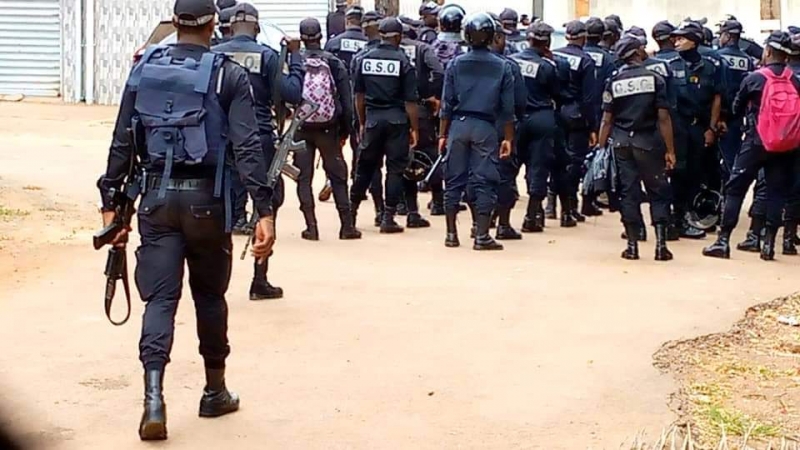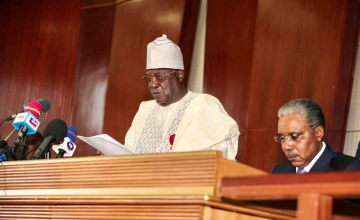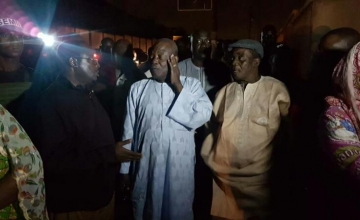
The independent organization working to prevent wars and shape policies that will build a more peaceful world says Cameroon’s ethnopolitical tensions, on and offline, need to be eased as a matter of urgency.
“Facebook, the country’s most used social media platform, should work with the government, opposition, and civil society to limit inflammatory content or misinformation lest intercommunal relations break down further,” Crisis Group said.
“We have seen a rise in ethnic and political tensions marked by disagreements over the conduct of elections, the rise of fake news, inflammatory language and hate speech on the internet, especially on the Facebook platform,” Arrey Elvis Ntui, Senior Analyst for Cameroon at the International Crisis Group told DW. “Cameroon cannot simply afford to allow the ethnic and political tensions it is currently facing to rise to levels where they could constitute inter-community violence.”
The non-profit organization notes that Cameroon’s opposition leader Maurice Kamto continues to dispute the 2018 presidential election results, while his supporters and President Paul Biya’s exchange invective that often descends into ethnic slurs.
Fuelled by online trolling, such hate speech is leading to violence, Crisis Group warns.
As an organization that sounds the alarm to prevent deadly conflict, Crisis Group says tensions between the Biya and Kamto camps, increasingly framed along ethnic lines, threaten national stability, already rocked by the separatist insurgency in the country’s Anglophone regions.
These strains risk tearing at Cameroon’s national fabric, with more bloodshed likely if the government takes no corrective action, Crisis Group insists.
“Crisis Group proposes that Cameroon strengthens its institutions which are responsible for addressing discrimination and improving its policy of living together. The ruling party in particular, and the opposition parties, should take measures to address the excesses of their own supporters’ behavior on social media,” Arrey said.
Executive Summary of Thursday’s report
“Political and ethnic tensions unleashed by the disputed 2018 presidential election still roil Cameroon, already facing a separatist insurgency in its Anglophone regions. Defeated opposition politician Maurice Kamto continues to challenge the vote’s outcome, while President Paul Biya shows no sign of wanting to relinquish power after 38 years in office. Their supporters are now insulting each other with ethnic slurs online, especially in the country’s most popular social media forum, Facebook. Ethnic strains are rising alongside hate speech, trends that, if they escalate, could endanger Cameroon’s stability. To cool things down, the government should enter talks with its opponents about the electoral system and move to make that system fairer. It should introduce legislation barring ethnic discrimination and empower the National Commission for the Promotion of Bilingualism and Multiculturalism to enforce quotas for the country’s many ethnic groups in public institutions. For its part, Facebook should do more to filter out hate speech and promote verified content to limit the spread of misinformation.
“The dispute over the 2018 presidential vote, which many observers, including the Catholic Church, criticized as flawed, continues to shape Cameroonian politics. Since electoral authorities declared him runner-up to Biya, Kamto has contested the result, culminating in his February 2019 arrest on charges of insurrection, sedition, and inciting violence. Even after leaving prison in October 2019, he has regularly lambasted the government for its failure to reform the electoral system. He and his party boycotted municipal and parliamentary elections in February 2020. Their abstention left the ruling party with an overwhelming majority in parliament, meaning that the government’s main rivals are not there to engage it in a debate about the country’s major problems.
“Kamto and his allies continue to butt heads with the government on the country’s most divisive issues. Kamto, himself part of Cameroon’s Francophone majority, criticizes the government for holding elections in which few Anglophones could vote due to violence and a separatist-led boycott. He accuses Biya of mishandling the Anglophone crisis by prioritizing force over dialogue. During street protests, he has advocated for the release of jailed separatist leaders, leading the government to depict him as a dangerous rabble-rouser. Among both Biya’s supporters and
“Kamto’s, many frame the political dispute as a competition for power between their respective ethnic groups – between, on one hand, Biya’s Bulu group, indigenous to the Francophone South region, and the Beti of the Francophone Centre with whom the Bulu identify; and, on the other, Kamto’s Bamileke, indigenous to the Francophone West.
“The COVID-19 pandemic and regional elections that the government has called for in December have only exacerbated tensions. Kamto asked parliament to vote on whether the president, who was absent from public view for some weeks when coronavirus infections started to spread, was still fit to govern. On 22 September, after Biya announced that elections of regional councilors would take place in two months’ time, Kamto launched peaceful street protests with the stated aim of ousting the president.
“As the political temperature has risen, Cameroonian politicians and the public are making more use of social media to press home their messaging and their views. While the growth of social media has been a boon for free speech, the sector is weakly regulated. Activists of all political persuasions use it to propagate misinformation, widen ethnic divides and even incite violence. Inflammatory content online pitting Bulu and Beti against Bamileke has stoked tensions. Online videos of anti-Biya protests in Geneva in June 2019 prompted MPs from the South – largely Biya loyalists – to accuse emigres from the West, who are generally regarded as Kamto supporters, of tribalism. Violence broke out among these groups in Sangmelima in the South in October 2019, although it caused no fatalities. While it is hard to make a direct causal link, the juxtaposition of online antagonism and real-life skirmishes raises concern that the former could stoke the latter.
“Neither side has taken action to temper its supporters’ rhetoric. Senior Cameroonian officials voice concerns over the online vitriol but have done little to reduce it. Any action the government takes in the name of curbing hate speech is usually a smokescreen for repressing its opponents. As for the opposition, it has done little to moderate its supporters’ tone, either, instead of blaming the government for tribalizing politics to sow division among Cameroonians who oppose Biya. For their part, national communications watchdogs remain under-resourced and distrusted by the public, without clear mandates to tackle what could be a threat not just to the government but to the country’s stability. Facebook itself does not devote adequate resources to stopping toxic online discourse.
“If the logic of ethnic politics takes root, today’s tensions could extend into still worse inter-ethnic disputes as to the ruling party and opposition position themselves for the end of Biya’s presidency. Such a scenario could pose a grave threat to a country that counts over 250 ethnic communities. It would be particularly tragic given that inter-communal relations have traditionally been reasonably harmonious, at least nationally (there have been frequent bouts of local ethnic violence, usually over land). The government, opposition, and social media companies can all play a role in soothing frictions:
“First and foremost, the government should initiate dialogue with the opposition outside parliament to build consensus on electoral reform. President Biya and his party have little enthusiasm for such reform, but it appears to be the only way to bridge the widening gulf between them and their rivals. Without it, opposition frustration will grow and feed even more ethnic division, a genie that at some point will be hard to put back in the bottle. Reforms might include the introduction of a single ballot, as opposed to the multiple ballot system Cameroon currently uses that is open to manipulation, a more independent national elections body, timelier and more transparent election results.
“The government should bar ethnic discrimination in public-sector employment by introducing amendments to expand the scope of the law proscribing “contempt of tribe”. It should also reform the National Commission for the Promotion of Bilingualism and Multiculturalism, a body established in 2017 but which is under-resourced and currently only has an advisory role, to redress such discrimination.
“Facebook should ramp up its capacity – including through hiring more content moderators familiar with Cameroonian political culture – to sift through online content and identify inflammatory posts, with the aim of more proactively censoring such material. It should increase its outreach to actors across the political spectrum and work with them to better evaluate toxic content. For their part, the government and opposition parties should push their supporters to adopt responsible online community standards.
“Working with government institutions, the opposition, and civil society actors, Facebook should redouble efforts to ensure that it has verified their pages. By promoting verified pages, the company can assist users in differentiating bona fide information sources from misinformation.
“Obstacles stand in the way of such steps. President Biya himself may resist measures he perceives as jeopardizing his position. Many in the ruling party, with their eye on keeping power after Biya’s departure, will feel the same. Politicians on all sides have been too slow to condemn divisive rhetoric. Moreover, trusting the government alone to curb inflammatory speech would run the risk that it would use such measures to crack down on rivals. Outside pressure, for the most part behind the scenes, from those with influence in Cameroon – notably the U.S., the African Union, France, and other European countries – will be crucial in pushing for electoral reform.
“Still, both camps possess politicians who recognize the danger. President Biya himself should be wary of leaving behind a country riven apart not only by fighting and mounting separatist sentiment in Anglophone areas but also by wider tensions endangering Cameroon’s historically relatively amicable inter-ethnic relations. Acting now to mend fences with his opponents and cooperating with Facebook to stem hate speech would go some way toward minimizing that risk.”














